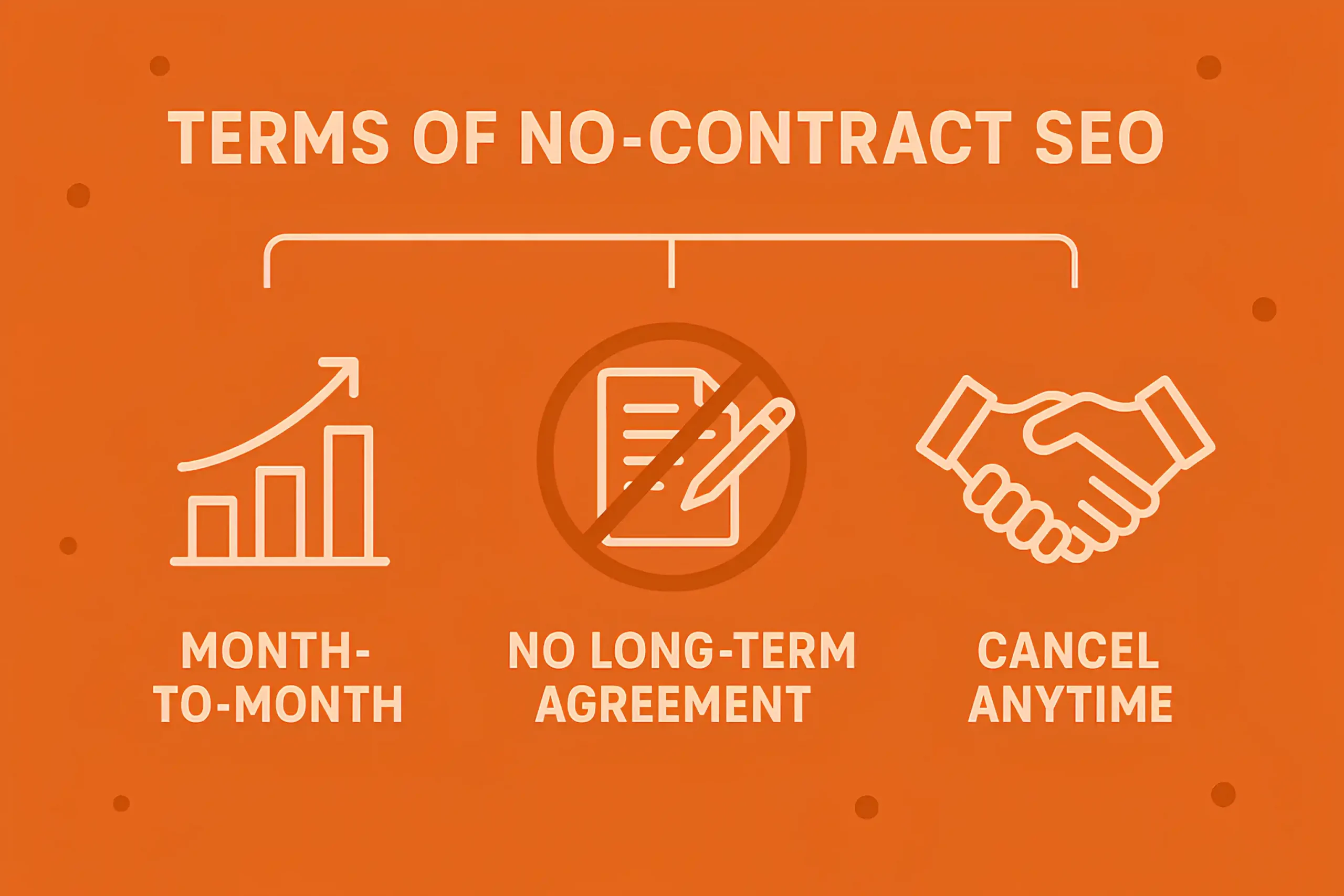Updated January 11, 2026
No-Contract SEO: What to Expect, Terms and Safety: (2026 Edition)
If you’ve ever signed a 6 or 12-month SEO contract and got frustrated partway in, wondering where your money’s going and what’s getting done, it’s a more common story than you think. Many business owners have been disappointed by unclear promises, slow results, or poor communication.
People want control, clarity, and real progress without being tied down. Maybe you want to test a new agency, maybe you have a short-term goal or a limited budget, maybe you’re just tired of hearing “SEO takes time” without seeing anything meaningful happen.
In this guide, I will explain what to expect with no-contract SEO, from how the terms usually work to what results are possible to achieve without locking yourself into a long-term deal. I’ll also cover what’s safe and what’s not, how to tell if you’re getting real value, what to consider, and answer common FAQs I’m sure business owners are looking for.
What Is No-Contract SEO?
No contract SEO is exactly what it sounds like: SEO services without locking yourself into a long-term agreement. Instead of signing a 6- or 12-month contract, you pay month-to-month, and you’re free to stop whenever you want. That means you can test the waters, see how things go, and only continue if you’re happy with the results.

Some businesses avoid long-term SEO contracts because they’ve been disappointed before; promises were made, but results didn’t come. Others simply want more control over their SEO budget. When you’re locked into a 6 or 12-month deal, you’re basically hoping the agency delivers. But with month-to-month or flexible terms, you can test performance, adjust strategies quickly, or move on if things don’t move.
No-contract SEO is different from traditional SEO retainers in one major way: flexibility. With a traditional retainer, you’re committed to a fixed monthly agreement; whether the agency delivers or not, you still pay. There’s usually a minimum commitment, and getting out early can be expensive or awkward. However, with no-contract SEO, you put the pressure on the provider to earn your business every month.
It’s perfect if you’re testing out SEO for the first time, running a short-term campaign, or simply don’t want to commit long-term without seeing proof first. It’s also ideal for startups, seasonal businesses, or companies that have changing goals. If you’re still figuring things out, or just want to see how things go before diving in deeper, no-contract SEO gives you that breathing room.
What You Should Expect When There’s No Contract
When there’s no contract, the biggest mistake most owners make is expecting results in 30 days. If that’s your mindset, you’ll almost always become disappointed, not because your SEO isn’t working, but because SEO takes time, my friend, especially if your site has low authority, technical issues, or if you’re competing in a tough niche.
Whether you’re committed to twelve months or month-to-month, the process is still the same. You’re not hiring an SEO agency to run a quick audit and rank you next week. You’re hiring a team to do SEO: strategy, execution, testing, fixing, scaling, etc. That means depending on your niche, your budget, your resources, your content, and yes, even your timing and luck, you might see strong movement in three months, or it might take six, eight, or even twelve.
The “no contract” part simply means that you’re not stuck. If the agency’s disorganized, if you’re seeing bullshit instead of progress, if there’s no structure, no clarity, no work happening, you can just walk. That’s the freedom you get.
The Terms of No-Contract SEO
I think with no-contract SEO, the scope of work becomes the contract. I mean, everything starts with clear deliverables. What exactly are we doing this month? Is it 8 blog posts, 20 backlinks, a technical SEO audit, CRO recommendations, and keyword gap analysis? The expectations have to be on paper. If that’s not happening, that’s the first red flag.
How will we judge success month to month? That’s the question. It’s not about whether you’re ranking #1 for a tough keyword in 30 days. It’s whether the agency is doing the work they promised, whether that work makes sense, and whether they’re moving in the direction that fits your long-term goals.

I’m sure you’re also wondering about the payment; most no-contract setups run monthly. You pay upfront for the upcoming month’s work. Once the work is done and reported, you decide whether to continue.
So yeah, there’s freedom. But that freedom needs structure, honesty, and consistency.
Who Offers No-Contract SEO?
Many SEO freelancers, boutique agencies, and even some larger digital marketing firms have started offering no-contract SEO services to meet growing demand for flexibility. You’ll find solo SEO consultants on platforms like Upwork or LinkedIn, as well as performance-driven agencies that focus on transparency and short-term results to build long-term trust.
Some companies promote “pay-as-you-go” or “month-to-month” SEO, especially those that specialize in small businesses, local SEO, or startups. Just make sure to look for proven experience, clear deliverables, and realistic expectations.

Yes, you can also outsource SEO without a contract. I know many businesses prefer this approach, especially when working with freelancers or agile agencies.
Freelancers vs Agencies: Who Does It Better Without Contracts?
I think freelancers are often more flexible. They’re used to short-term gigs and project-based work, so a no-contract setup is business as usual. You can work with them on a weekly or monthly basis, test their skills fast, and easily walk away if it’s not a good fit.
Good freelancers or fractional SEO consultants usually specialize in a few core areas, like link-building, technical audits, or content, and you get direct access to the person doing the work.

Agencies, on the other hand, are more structured, even without a long-term contract. Many are now offering no-retainer or month-to-month options to keep up with demand. They usually have better reporting tools, more robust processes, and internal accountability.
But agencies come with overhead. You might pay more, and in a no-contract relationship, some agencies may hold back their best efforts early on, waiting to “prove” themselves slowly, because they know you can walk away at any time.
Price Ranges and What They Usually Include
No-contract SEO pricing varies widely depending on who you hire (freelancer vs. agency), the scope of work, and the complexity of your website or niche. For example, for freelancers, you’ll typically pay anywhere from $1500 to $3,000/month. At the lower end, expect keyword research, basic on-page SEO, and maybe some light backlink outreach.

At the higher end, they may include technical audits, competitor analysis, and ongoing link-building. Keep in mind that freelancers usually specialize, so you might need to hire multiple people for a full strategy.
Small to Mid-Sized Agencies range from $2,000 to $5,000/month. For this price, you should expect a more structured service: technical SEO, keyword targeting, content planning, link-building, monthly reports, and strategy sessions.
Enterprise-Level or Niche Agencies (like SaaS or Healthcare SEO): Plans often start at $5,000 and go up to $15,000+/month. These come with custom audits, full team involvement, dedicated strategy leads, enterprise link-building campaigns, and CRO/testing integrations.
Is No-Contract SEO Worth It in Competitive Industries?
Usually, no. No-contract SEO can work for low-competition niches, short SEO audits, or small local businesses where quick wins are possible. But in crowded spaces, it usually leads to basic work, disconnected efforts, and client turnover. In my opinion, most SEO agencies won’t invest fully if they know you can walk away next week, and you won’t see real ROI without giving the strategy time.
How Can I Trust an SEO Provider Without a Long-Term Deal?
Look at what they do before they ask for anything long-term. A trustworthy SEO provider, contract or not, will be transparent from day one. They’ll show you what they plan to do, why it matters, and how they’ll measure success. They’ll walk you through past results, explain what’s realistic for your site, and give you a plan that makes sense, not just generic promises.

Also, pay attention to how they communicate. Are they responsive? Do they sound like they know your industry? Are they honest about what they can’t guarantee?
Plenty of good SEO providers work without long-term contracts to build trust first, but that trust has to come from clarity, proof, and consistency.
Is It Smart to Test an Agency This Way Before Committing?
Yes, but only if you know what to look for. Testing an agency with a no-contract setup is a smart step if your goal is to evaluate how they work, not to expect results in 30 days. It’s less about rankings and more about seeing how organized they are, how they communicate, whether they follow through, and if their strategy makes sense for your site.
Watch how they prioritize tasks. Are they going after quick wins or just keeping you busy? Are they transparent with reporting? Do they explain why they’re doing something, or just use unclear jargon?
Can I Combine No-Contract SEO With My In-House Efforts?
Yes, why not! If you have an in-house SEO team handling content, dev, or social, bringing in a no-contract SEO provider can fill the gaps without long-term complications. You can outsource link-building, technical audits, or keyword research while your team executes the strategy. It keeps things flexible, cost-efficient, and fast-moving.
However, if your provider doesn’t understand what your team is already doing, it can lead to duplicate work, missed priorities, conflicting approaches; it happens more than you think.
How Often Do No-Contract SEO Projects Fail?
I could not find any specific statistics, but I think more often, especially when expectations are off. No-contract SEO fails when clients expect big results fast, and providers deliver just enough to keep things going another 30 days. There’s often no deep strategy, no roadmap, and no commitment from either side.

In my opinion, it also fails when communication breaks down. The agency doesn’t fully understand the business, and the client doesn’t know what to look for, so both become frustrated or stuck in “it’s too early to tell” mode until someone leaves the table.
Is No-Contract SEO the Same as One-Time SEO?
Of course, no! No-contract SEO means you’re not committed to a long-term agreement. You can continue month to month, pause, or stop anytime. But it’s still meant to be ongoing work, just with more flexibility.
One-time SEO, on the other hand, is a single engagement. Maybe it’s a technical audit, keyword research, or cleaning up on-page SEO. It starts, ends, and that’s it: no follow-up, no monthly optimization, no long-term plan.
When No-Contract SEO Is a Bad Idea?
It becomes a bad idea when you expect long-term results with a short-term mindset. If your site is new, in a competitive space, or needs serious cleanup, no-contract SEO often falls short.
It’s also risky if you’re not sure what to look for. Without a longer relationship, you might not even notice if the agency is cutting corners, outsourcing poorly, or just doing generic work. If you’re jumping from one provider to another every month, that’s not great (But, again, it depends).






